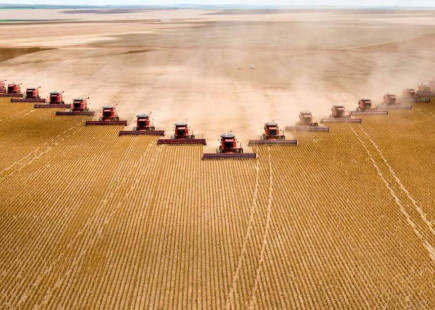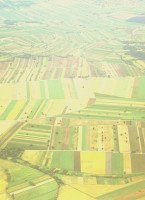Will 'climate smart agriculture' serve the public interest - or the drive for growing profits for private corporations?
Topics
'Climate smart agriculture' has become the buzz phrase at high level international policy discussions. Will it be the latest manifestation of greenwashing of unsustainable industrial agriculture or the basis for developing real, grassroots-led, resilient food systems?


The race is on to deliver models of agricultural development that are viable and sustainable in a world of accelerated climate change. The urgency derives from the fact that the food and agriculture sector is both a major contributor to climate change and especially vulnerable to its worst impacts. Most studies estimate that between 20-35 percent of anthropogenic greenhouse gases are associated with the food and agriculture sector, while some have it as high as 50 percent.
A fundamentally different perspective on what makes agriculture ‘climate smart’ comes from a mix of social movements, farmers’ organisations such as Via Campesina, small-scale fishers, NGO alliances and academic researchers.
Industrial model
And as drought and extreme weather events associated with climate change increase, the livelihoods of a huge proportion of the world’s population – over 2.5 billion people – who make their living from the sector are on the line. Against this background the idea of ‘climate smart agriculture’ increasingly features in high level policy discussions. Climate smart agriculture (CSA) describes interventions that generate ‘triple wins’: that make agriculture more resilient to the effects of climate change, in ways that reduce poverty and increase yields, while at the same time reducing the substantial emissions created by the agricultural sector. These goals are widely accepted, but there are vastly different models on offer for how to achieve them, each vying to come out on top. The stakes are enormous, as the model that dominates will shape the future of agriculture for years to come. One view, already dominant in policy circles, seeks to apply ‘fixes’ to the existing industrial model of agriculture to make it more sustainable.
Questionable sustainabilty
This model employs a suite of modern technologies and practices including genetic engineering, biofuels, biochar, and increased use of fertilisers that will deliver a ‘sustainable intensification’ of production. This approach is underpinned by Malthusian assumptions about growing populations and dwindling fertile land, asserting that ‘we’ need to extract more with less to sustainably ‘feed the world’. The main champions of this dominant approach are the World Bank, UN bodies such as Food and Agriculture Organisation and the International Fund for Agriculture and Development (IFAD) and large agribusiness corporations. They find it attractive because it requires only slight changes to business as usual, while providing new opportunities for profit. CSA projects provide a convenient cover for attempts to introduce controversial technologies into new markets or gain access to growing markets for their products, with questionable sustainabilty impacts.
Food companies
‘Climate smart’ projects such as Water Efficient Maize for Africa (WEMA), for example, establish smallholder dependence on Monsanto’s specially developed proprietary hybrid seeds. Not surprisingly, this version of CSA is rapidly being adopted and promoted by transnational business interests, and endorsed by international agencies and initiatives. Headline CSA programmes such as the GACSA (Global Alliance for Climate Smart Agriculture) and EPIC (Economics and Policy Innovations for Climate-Smart Agriculture) focus explicitly on engaging commercial actors, and CSA is increasingly being mainstreamed into Corporate Social Responsibility (CSR). Global firms such as McDonald’s and Kellogg’s, for example, have made commitments to ‘climate smart’ approaches as part of the GACSA. Wal-Mart, meanwhile, has announced its own ‘Climate Smart Agriculture Platform’ in partnership with its suppliers and well-known food companies like General Mills and PepsiCo, promising to drive the ‘adoption of best practices in agriculture’.
Different perspective
Fertiliser companies such as Yara, Mosaic and Haifa Chemicals Ltd are also among the members of GASCA. These companies are joined by a number of fertiliser lobby groups such as Fertilisers Europe and the Fertiliser Institute, as well as NGOs partnered with fertiliser companies such as Agriculture for Impact. Their involvement reflects the fact that nitrogen fertilisers require an enormous amount of energy to produce; fertiliser production accounts for 1-2 percent of total global energy consumption and produces about the same share of global greenhouse gas (GHG) emissions. Embracing CSA through such initiatives allows these firms to claim to be part of the solution, rather than a major source of the problem. A fundamentally different perspective on what makes agriculture ‘climate smart’ comes from a mix of social movements, farmers’ organisations such as Via Campesina, small-scale fishers, NGO alliances and academic researchers.
Organic food
These groups are heavily critical of the mainstream CSA discourse, which they see as only further entrenching unsustainable and unjust practices. For example, the civil society group ‘Climate Smart Agriculture Concerns’ first came together in late 2014 to reject the premise of CSA as a form of corporate greenwashing. Among its members are La Vía Campesina, Greenpeace, ActionAid International in addition to a number of farmer organisations and human rights organisations. These critics argue that since industrial agriculture is one of the key drivers of climate change, it is unlikely solutions to global warming will come from that system. They advocate instead combinations of agroecology, permaculture, food sovereignty, and organic food production.
Climate resilient
For them, what is needed is a ‘farmer first’ rather than ‘corporate first’ approach to determining which technologies, inputs, institutions and land and ocean management strategies are most likely to deliver socially desirable and ecologically viable agriculture. They have come together at strategic international events like COP21 to denounce mainstream Climate Smart Agriculture programs, while also putting forward new initiatives for the convergence of land and water struggles, finding common ground under the banner of food sovereignty, agroecology, gender equality and human rights. Yet to date, judging by a suite of recent reports and the nature of debate at recent rounds of UN climate change—including the ‘Agriculture Action Day’ at the Bonn negotiations in November 2017 and the 2016 COP22 in Marrakesh, labelled the ‘Action for Agriculture CoP’—the dominant view is winning the race to define CSA. Those who stand to gain from the mainstream CSA model are mobilising most vociferously in proposing only those ‘solutions’ that further reinforce their market and political power. The problem is that the more that corporate-friendly models of CSA dominate the landscape, the more they undermine the ability of alternative models of climate resilient agriculture to flourish. This is a critical moment to avoid the debate about climate smart agriculture being reduced to a set of techno-fixes that benefit agribusiness corporations and to make the case that the system of industrial agriculture itself has to be fundamentally transformed if we are to live sustainably.
These Authors
Peter Newell is a Professor of International Relations at the University of Sussex. He is a member of both the ESRC STEPS centre on sustainability and the Centre for Global Political Economy at Sussex. Twitter: @stepscentre.
Jennifer Clapp is a Canada Research Chair in Global Food Security and Sustainability and Professor in the School of Environment, Resources and Sustainability at the University of Waterloo, Canada.
Zoe W. Brent, Transnational Institute (TNI), Agrarian and Environmental Justice Team, while pursuing her PhD at the International Institute of Social Studies (ISS). Twitter: @zoebrent
A new special issue on the Journal of Peasant Studies that has open access to the public has a series of articles on different aspects of Climate Smart Agriculture.


